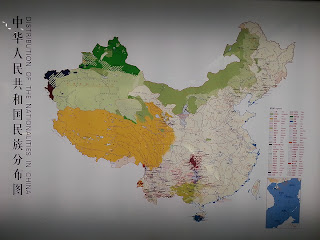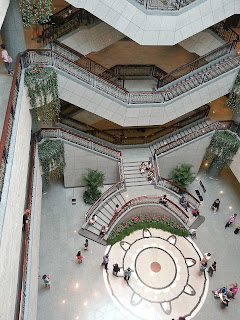On Sunday Margot and I decided to head out to the Shanghai Museum.
On our way out of the hotel we ran into a wedding celebration. Earlier this morning at breakfast we heard fireworks going off outside the hotel in preparation for the celebration. Later, when we left for the museum, we ran into the bridal party leaving.
We took a taxi across the Pu river to the museum in downtown Shanghai.
Shanghai is divided into two parts. Pudong, east of the Pu and Puxi, west of the Pu.
Margot and I have both been to the museum before when we were in Singapore so we skipped the lower levels and started on the 3rd floor with Chinese painting.
This piece, Endless Autumn Mountains after Huang Gongwang, was painted in 1619.
Another gallery was dedicated to ancient Chinese seals. They were originally symbols of authority and later used as signatures for private persons.
Some of these seals date to the 16th century B.C.
The large piece on the right is a multi-sided seal. It produces the print in the picture below.
I didn't notice the small seal on the left until I looked at the pictures. I'm not sure what message it is supposed to be sending.
This is a print from the seal above.
The next gallery was the Chinese minorities arts and crafts gallery. This map details where the minorities are found.
In case there is any uncertainty, the large orange area is the Tibet minority area. It is just another minority area of China.

I'm not sure which minority these are from but Margot was impressed by the embroidery.
Some are very colorful.
This is a baby carrier with a lot of detailed embroidery.
Another.
As with yesterday, all the pictures were taken with Margot's
I don't remember where these earrings are from.
I'm pretty sure this is a Tibetan mask.

This is a wooden folding book shelf made by the Uyger nationality in far western China.
Greg let me know if you figure out how to make one of these.
When we went up to the top floor, I took this picture from the escalator platform.
The museum is very nice. I think it opened in 1996. It very modern and well done - world class.
The admission cost is zero.
The figure on the left is a Tibetan statue of the white Tara. This female deity has 7 eyes.
The next gallery was the jade gallery. Some of the pieces date to the 2500 B.C.
This piece has an interesting turquoise inlaid handle.

This piece is carved on a couple of different levels.
This piece dates to the Jin dynasty (1115-1234 AD).
There is a gallery dedicated to Chinese furniture.
That window screen design looks similar to one I've seen before.
This folding chair looks really uncomfortable.
I'm not sure what the story on the stork is. I just liked the picture.




















No comments:
Post a Comment